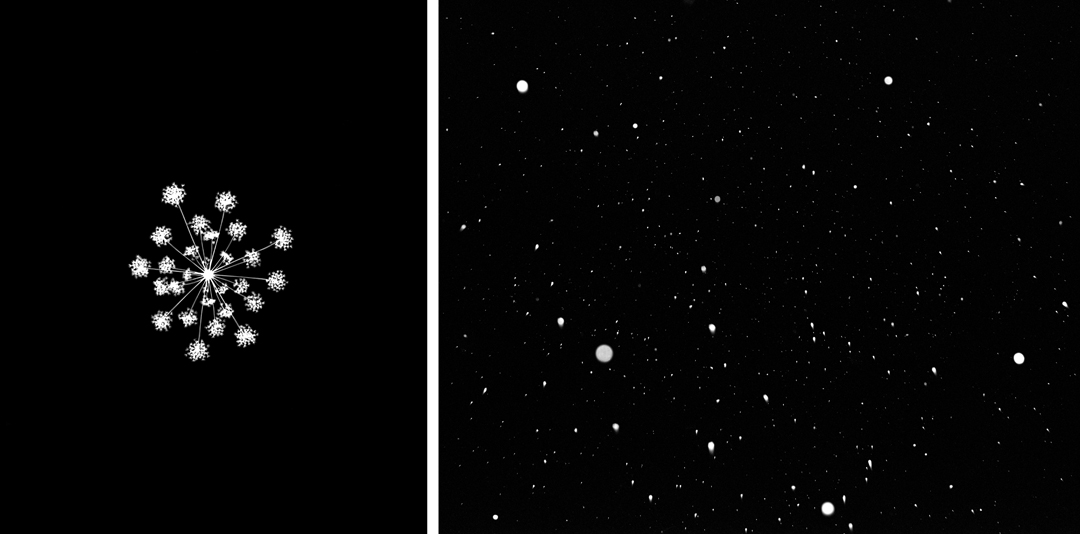Music for Space Stations
On Minnesota's second coldest March 1st ever, electronic musicians Justin Meyers, Eric Frye and Jeff Witscher played a show at Midway Contemporary Art. Writer Jay Orff offers an essay on the scene.

This cold winter (“operatic” one friend called it) reached its extreme for me a few weekends ago when the main sprinkler pipe froze and burst in my apartment building. Water flooded through ceilings, along hallways, everywhere. In the building’s elevator, water dripped through the ceiling lights, down the walls, and puddled on the floor; I stood in there briefly, as if surrounded by a metamorphosing world. By some stroke of luck, my apartment was spared. My main regret was that I hadn’t grabbed a camera to capture on film a few minutes of that bizarre visual landscape and myself standing there, in what felt like a moment straight out of a Tarkovsky film.
The night before, I had ventured out into the second coldest March 1st ever to see some experimental electronic music at Midway Contemporary Art gallery. The show featured two Twin Cities musicians, Justin Meyers and Eric Frye, and another from Los Angeles, Jeff Witscher. I am a fan of and occasional dabbler in the electronic arts, and I have friends with extensive catalogs and knowledge of electronic music, but I am not an expert. My knowledge of the genre is similar to that of the average listener, if there is such a thing, and at least partly influenced by the sort of synthesized sounds given wide audience in science fiction movies. If you think about it, the pattern of R2D2‘s speech is a sort of electronic composition, one that telegraphs the way he “feels.” What I mean is: when I walk into the gallery I am, consciously or not, already primed to hear the music through that filter.
After Frye, there is a much shorter break before Jeff Witscher, the final performer of the evening, stands in front of his Mac, eschewing the box of knobs for a more portable laptop. Both Meyers and Frye, in contrast to those of us in the audience, are well-coiffed and dressed fashionably, in black and dark blue — their space-suit parkas and scarves hidden away in some other room, while the rest of us are left to wear ours, or try to drape them over chairs. Witscher, though, looks more like one of us as he takes the stage — the same confused look in his eye, the bearded chin and indifferent hair. Maybe it’s because he has travelled from L.A. – it must be a shock, after California, to arrive here in far-off, deep winter. His composition contains some recognizable sounds — sampled and reengineered, processed and looped. Like the others, he stands in front of his device, pushing small buttons, orchestrating sounds to blend what’s familiar into something strange, repurposing the workaday sounds of the world into something I can almost, but not quite identify.
Unlike the others, my mind doesn’t conceive of Witscher’s composition as some sci-fi accompaniment; it doesn’t sound to me like Space Age music. There’s something rooting the piece back in daily life.
Listening to all three composers, I’m struck by electronic music’s unique sense of being created from the inside out, in such a way that nearly any sound one can imagine – any burble or wave or staticky envelope – can become real. In this music there’s a curious interplay between traditional musical tone and rhythm and the infinite possibilities of applying filters and plug-ins to incidental noises. The sound of a match lighting can be folded over, dissolved and reintegrated into something different, impossible. You can discover a whole new universe, chart a whole new imagined world.
With the music portion of the evening over, the hum of the crowd returns. It’s soothing, the thought that we all crossed the breathtaking vacuum of subzero space ro hear this music, a hardy lot of souls accepting the challenges of being alive to entertain the limits of the imagination.
Related links and information:
Meyers, Frye and Witscher performed at Midway Contemporary Art, Minneapolis March 1, 2014. More on the artists:
Splice Free, Meyer’s program of experimental music on KFAI
Tone Filth, featuring the recordings of Meyer
Sleepy Cobalt Sound, featuring the recordings of Eric Frye
Rene Hell (a Witscher alias) Bandcamp page
Jay Orff is a writer living in Minneapolis. His writing has appeared in Rain Taxi, Reed and Harper’s.

